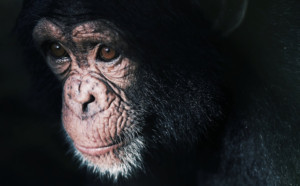Review: Hilarious But Heartbreaking, TREVOR Holds An Important Message On Connection, Communication And How We Care For Creatures That Can't Speak Up For Themselves

Wednesday 19th June 2019, 7:30pm, KXT
Shaun Rennie strikes a perfect balance of humor and heart in Nick Jones' funny and thought-provoking TREVOR. Drawing on a true story to challenge how we communicate and interact, with not just animals, but also each other, this piece is wonderfully multilayered, captivating and convincing.
In 2009 Travis, a 14 year old 91kg common chimpanzee, hit international headlines for violently attacking a woman in Connecticut. Travis had been socialized with humans since he was adopted at 3 days old and had featured in television shows and advertisements. He was known for his ability to do 'human' things like eat at the table, drink wine and use a computer to look at pictures as well as other things. He was well known and liked in his hometown of North Stamford and many, particularly his human 'mother' Sandra Herold and former co-star Morgan Fairchild, believed that he would never hurt anyone. Nick Jones uses this story as inspiration for TREVOR. He gives Trevor (Jamie Oxenbould) a 'voice' to allow the audience to understand what was possibly running through the performing primate mind and realize that it quite possibly rarely matched what Sandra (Di Adams) imagined he was thinking. She saw him as a child. He saw himself as a grown up out of work actor desperate to get back to Hollywood.
As per Jones' intentions, TREVOR is simply a human expressing the physical movements of a chimpanzee which ensures the work blurs the lines between primate and human. Oxenbould, in t-shirt and denim overalls, is brilliant at capturing the nuances of the animal's movement and his Bronx Italian middle-aged man sound ensures that the audience definitely see that TREVOR, a 14 year old chimpanzee, is well and truly an adult in terms of the chimpanzee life cycle. He ensures that Trevor has the level of obnoxiousness that would have the audience hating him if he was a human but manages to still make people feel sympathy for the animal that has been taught to 'perform' for peoples' entertainment.
As adoptive mother Sandra, Di Adams presents the image of a fiercely protective parent that has lost a grip on the reality that Trevor is not a human and is no longer little and cute. She cuts a tragic figure as the woman who has turned her whole world into Trevor's care, seemingly having no other family and little other human interaction aside from the hysterical neighbor Ashley (Ainslie McGlynn). Just as Sandra is a protective mother, Ashley is equally so and McGlynn captures her hysteria and prejudice well. Her physicality when expressing fear whenever Trevor ventures too close is subtle enough to ensure the piece isnt completely absurd but is actually a rather realistic for a paranoid woman trying to act polite but quietly having a fear of the unknown.
As Morgan Fairchild and Oliver, two characters from Trevor's imagination, Eloise Snape and Garth Holcombe have created two fabulously over the top visions. Snape, with the aide of the worst of 80's fashion, has created a heightened version of the soap star diva and Holcombe, in elaborate white suit that puts Liberace to shame, delivers a deliciously camp chimpanzee fantasy of success.
In the 21st century society has generally come to the understanding that having animals perform for human entertainment is not right and the dressing up and mimicking of human behavior is decidedly distasteful but there are still situations where animals are still held for human amusement with little regard for the animals' welfare. TREVOR hopefully will serve as a reminder that many times the keeping of wild animals as 'pets' has not ended well and that it should be stopped.
On a more human level, TREVOR also provokes thought about how we communicate. Do we really stop to figure out what the other person is thinking or do we, like Sandra and Trevor blunder along attributing what we want someone else to feel rather that actually communicating.
TREVOR is wonderfully funny but also heartbreakingly poignant in is presentation of relationships and how we interact with the people around us. It is also a fine example of how physical comedy can be made without turning the story into a mockery.
http://www.kingsxtheatre.com/trevor
Videos
